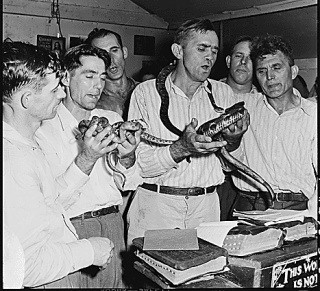The modern version of snake (serpent) handling began as a religious ritual in the Appalachia region of the U.S. by George Hensley. He introduced the practice, based on a literal interpretation of Mark 16:17 - 18, to a Holiness movement church around 1910.
Hensley became a credentialed minister of the church in 1915. After seven years of service, he left the denomination that credentialed him to form the first Pentecostal church to require all its members to be able to handle a snake as proof of their conversion.
Those who practice the handling of such reptiles as a religious ritual believe Mark 16:18 should be interpreted literally. They view the verse as a promise from Jesus that serpents will not harm them (especially during the worship of God) because they are Christians.

Major Problems
One of the main problems with this Biblical understanding is that the tragic history of using a poisonous snake as part of the worship of almighty God contradicts the validity of their interpretation.
Many people have unfortunately died while handling these venomous reptiles in a church meeting or service. George Hensley, the "father" of this practice, died from a poisonous bite in 1955. In 1998, an 'evangelist' who used serpents during services died from a timber rattlesnake bite. His wife had died from a bite three years earlier.
In 2012, a pastor in the Pentecostal movement passed away after receiving a bite from a snake while leading an outdoor service.
In early 2014, a man named Jamie Coots, made famous through a popular cable TV show called 'Snake Salvation,' died from a poisonous bite. A Discovery Channel News article about his death stated those who have passed away from bites received while worshipping God likely number in the hundreds.
Mark 16 (and to a lesser extent Luke 10:19) are the only places in Scripture used to justify the handling of poisonous snakes. Jesus spoke the two verses referenced in Mark as part of his final instructions to his disciples (known as "the Great Commission") before his ascension.
And He (Jesus) said to them (the eleven apostles), "Go into all the world and preach the gospel to the whole creation. The one who believes and is baptized shall be saved, but the one who does not believe shall be condemned.
"And these signs shall follow those who believe: in My name they shall cast out demons; they shall speak with new languages; They shall remove serpents; and if they drink any deadly thing, it shall not hurt them in any way; they shall lay hands on the sick, and they shall recover." (Mark 16:15, 17 - 18).
Tempting God
After Jesus gave his disciples the authority to preach the gospel and baptize (Mark 16:15 - 16) he states in verse 17 that "these signs shall follow those who believe." Among the signs was the inability to be harmed by a snake or poisons, and the gift of healing the sick.
Taking Mark 16:18 as the sole "proof text" that guarantees snake handling will not harm Christians, regardless of the circumstances, goes against sound Scriptural teachings that we are not to tempt God (Deuteronomy 6:16, Matthew 4:7, Luke 4:12, 1Corithinas 10:9).
It is one thing to accidently encounter a poisonous reptile and be saved from death as was the Apostle Paul when he was shipwrecked on the island of Malta.
But when Paul gathered a bundle of sticks and laid them on the fire, a viper came out because of the heat and wound itself around his hand.
And when the barbarians (on the island of Malta) saw the snake hanging from his hand, they said to one another, "No doubt, this man is a murderer; although he has been saved from the sea, justice does not permit him to live."
But he shook the snake off into the fire and suffered no injury (Acts 28:3 - 5).
It is an entirely different situation, however, to knowingly put ourselves in harm's way with a snake. Such an act would be tempting God, akin to the devil tempting Jesus to throw himself off of the high tower of the temple in order to prove his Father loved him enough to save him (Matthew 4:1 - 11, Mark 1:12 - 13, Luke 4:1 - 13).